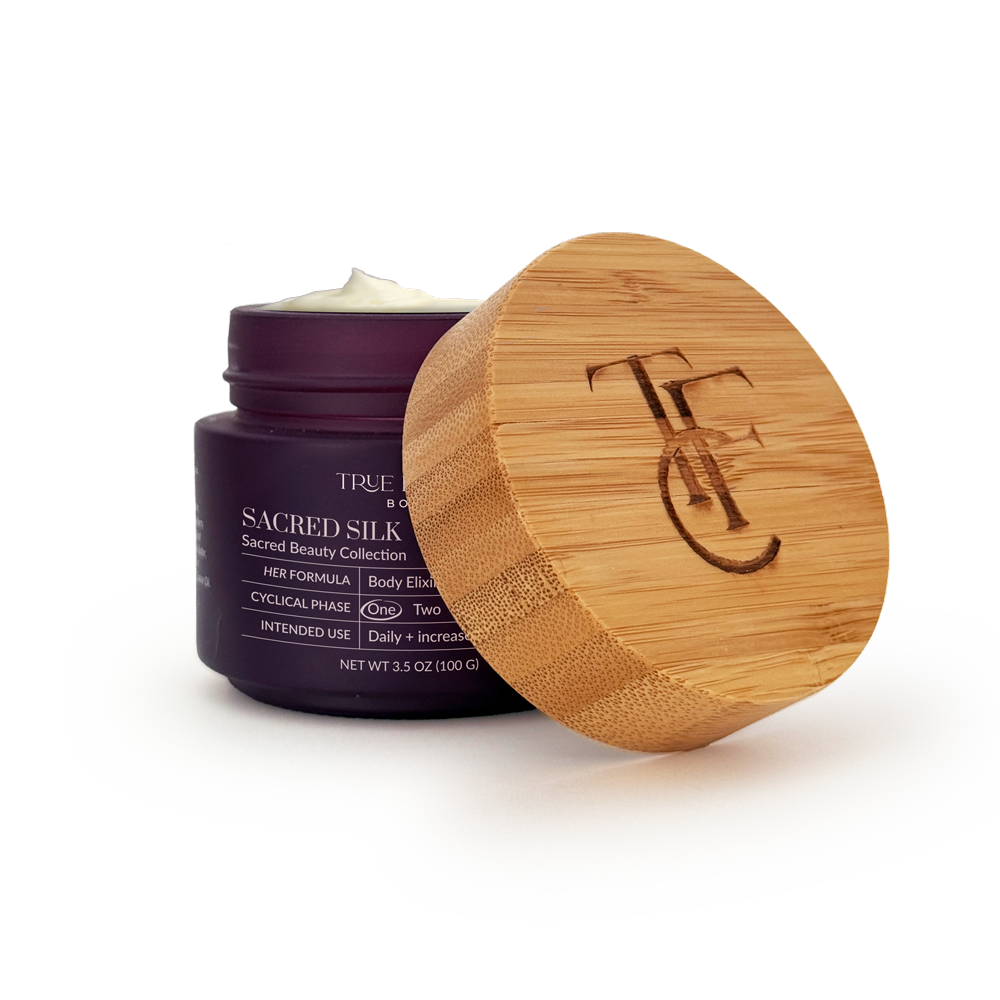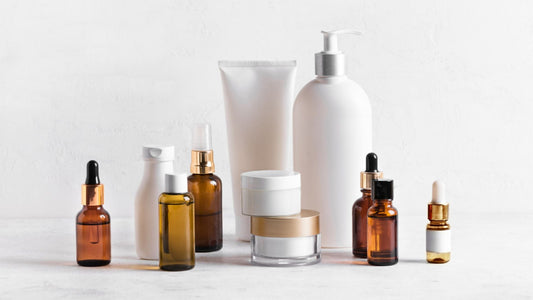Skincare that Supports Her
Pure performance skincare formulated for her skin. No fillers, ever. Because what touches her skin should nourish her whole being.

She’s not defined by one skin type—she’s cyclical skin.
We’ve been taught to label women's skin as fixed types—oily, dry, sensitive—but the truth is, a women's skin is constantly evolving, shaped by the hormonal shifts throughout a her cycle. At True Femme Collective, we formulate skincare to nourish her cyclical skin honoring the skin’s unique and changing nature.
Her Cyclical Skin
While a 28-day cycle is a common guide, each woman’s cycle is uniquely her own. These phase estimates can vary by 2–3 days—or more—and that’s entirely natural. Let this be a soft starting point for tuning in to your skin’s flow.
-
~day 1-5
Menstruation
She releases.
Skin may feel dry, sensitive, or Itchy. This is a time for anti-inflammatories, nourishing hydration, and rest.
-
~day 6-14
Follicular
She renews.
Estrogen rises, energy returns, and skin begins to brighten. Best time for cell turnover, brightining, and activating formulas.
-
~day 14
Ovulation
She glows.
Hormones peak, skin appears plump, radiant, and vibrant. This is her most magnetic phase—where radiance comes naturally, and skin asks only to be maintained.
-
~day 15-28
Luteal
She deepens.
As progesterone rises, the body turns inward. Skin may have flare-up, be sensitive, or reactive. This is a time to soothe, balance, and protect.
TFC Tip: Want to learn more about cyclical skin? Sign up for our emails and receive a free mini guide to understanding your skin’s natural cycle.

Sacred Silk: Her Skin’s Botanical Ally
Sacred Silk is more than a body butter—it’s an elixir designed to support her skin’s changes. Infused with powerful adaptogens, exotic butters, and whole-plant extracts, it calms skin stress, soothes inflammation, and deeply nourishes even the most sensitive skin.
Whether your skin is feeling dry, sensitive, or radiant, Sacred Silk adapts alongside you—offering cyclical skin care that nurtures resilience and supports her skin's unique flow.

Listen deeply, care gently
Skin care isn’t a battle—it’s a dialogue. Tune in and listen.
Loved by skin, trusted by women
Beyond the Surface
Deepen Your Skincare Knowledge-

Nature’s Sun Shield: How Sacred Silk Ingredients Help Defend Your Skin
Discover how Sacred Silk harnesses the power of pure botanicals to naturally protect and nourish your skin against sun damage. From UV-absorbing compounds like chamomile and chaga mushroom to antioxidant-rich oils and barrier-repairing butters, our formula supports your skin’s resilience and recovery every day. While not a replacement for SPF, Sacred Silk is a ritual rooted in plant wisdom that helps your skin glow through sun exposure with strength and hydration.
Nature’s Sun Shield: How Sacred Silk Ingredients Help Defend Your Skin
6 minute read
Discover how Sacred Silk harnesses the power of pure botanicals to naturally protect and nourish your skin against sun damage. From UV-absorbing compounds like chamomile and chaga mushroom to antioxidant-rich oils and barrier-repairing butters, our formula supports your skin’s resilience and recovery every day. While not a replacement for SPF, Sacred Silk is a ritual rooted in plant wisdom that helps your skin glow through sun exposure with strength and hydration.
-

Hyperpigmentation and Your Cycle
Dark spots acting up? Your hormones and cycle affect skin sensitivity, making treatments like IPL tricky. The fix? Plant-based oils like rosehip, carrot seed, and tamanu—powerhouses for both skin and reproductive health. Plus, timing IPL with your follicular phase prevents unwanted pigmentation. Nourish from within, track your cycle, and let nature do the rest! 🌿✨
Hyperpigmentation and Your Cycle
9 minute read
Dark spots acting up? Your hormones and cycle affect skin sensitivity, making treatments like IPL tricky. The fix? Plant-based oils like rosehip, carrot seed, and tamanu—powerhouses for both skin and reproductive health. Plus, timing IPL with your follicular phase prevents unwanted pigmentation. Nourish from within, track your cycle, and let nature do the rest! 🌿✨
-

Ditch the Toxins: 4 Simple Swaps to Detox Your Products
Ever wonder what your skin absorbs each day? Some ingredients—like propylene glycol—may feel silky but can quietly disrupt hormones and impact your long-term health. We saw this up close when our mom began tossing out products with harmful additives. It was a wake-up call. The truth is, many conventional beauty products contain toxins that can irritate skin, disrupt your cycle, and even accelerate aging. But change doesn’t have to be overwhelming. Start small. Read your labels. Choose plant-based formulas. Swap plastics for glass. Every gentle swap is a step toward a more nourishing, toxin-free routine. 🌿
Ditch the Toxins: 4 Simple Swaps to Detox Your Products
6 minute read
Ever wonder what your skin absorbs each day? Some ingredients—like propylene glycol—may feel silky but can quietly disrupt hormones and impact your long-term health. We saw this up close when our mom began tossing out products with harmful additives. It was a wake-up call. The truth is, many conventional beauty products contain toxins that can irritate skin, disrupt your cycle, and even accelerate aging. But change doesn’t have to be overwhelming. Start small. Read your labels. Choose plant-based formulas. Swap plastics for glass. Every gentle swap is a step toward a more nourishing, toxin-free routine. 🌿
Join Us. Glow More. Save $25.
Subscribe now to unlock $25 off your first purchase + a free Cyclical Skin Mini Guide for radiant skin through every phase!



